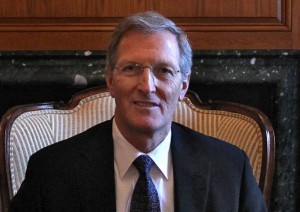
If you made $5 billion clearing a community’s forest and community food garden, polluted and drained their rivers, but gave them a tree and a bucket of clean water in return, would you feel justified saying you’re building healthy communities, preserving rivers and reducing deforestation? Would you pat yourself on the back?
Maybe not, but Cargill’s CEO Greg Page would.
Although that example is hypothetical, it captures the essence of Cargill’s 2012 Corporate Social Responsibility (CSR) report.
In a fancy PR dance, Cargill spins its business model—one that relies on devastating natural systems and communities for profit—to sound heroic, almost holy.
There are so many inconsistencies, in fact, between Cargill’s talk and its walk, that I’ve summarized the most glaring among them below:
1. “We have already implemented RSPO principles on our own [oil palm] plantations”…except, woops, Cargill can’t even get one of its two oil palm plantations RSPO certified. That’s embarrassing.
2. “Ninety four percent of the crude palm oil Cargill sourced in 2011 from Indonesia was from palm oil plantations that are RSPO members.” But oh wait, that is actually meaningless since RSPO membership means nothing more than a company who pays membership dues to the RSPO. As the largest importer of palm oil into the US, Cargill is using membership with the Roundtable on Sustainable Palm Oil (RSPO) as its only filter to keep controversial palm oil out of its supply chain. Without its own safeguards around deforestation, human rights and species and climate impacts, the palm oil giant cannot ensure its supply chain does not include palm oil from controversial plantation holders.
3. There is absolutely no mention of Cargill’s supply chain assessment results. Cargill made a big deal about its collaboration with WWF in 2010, but despite the assessment being finished months ago both parties have remained silent. Smells fishy.
4. “Treating animals humanely: we are committed to being at the forefront of animal welfare practices.” Cargill specifically touts the fact that 50% of its US hog facilities do not house sows in gestation stalls. What about the other 50%? These stalls represent some of the most horrific animal husbandry practices on the planet. Looks like Cargill needs to reference a dictionary on this one.
5. “[We specialize in] producing safe and wholesome food.” Wow, Cargill has some real nerve to say this after one of the largest meat recalls in history! Cargill supplies about 22% of the domestic meat market; this type of industrial consolidation does not bode well for animals or food safety. Last year Cargill did a nation-wide recall of over 36 million pounds of turkey produced at an Arkansas factory infected with salmonella, the second largest meat recall ever. As if the ground turkey recall in 2011 wasn’t bad enough, just last month Cargill recalled almost 30,000 pounds of beef due to possible Salmonella contamination. Clearly the “enhanced food safety operating principles” the company adopted after the 2011 turkey recall are not sufficient.
6. “Cargill is committed to the respect and protection of human rights, both within our own operations and across our supply chains”—except for palm oil, I guess. RAN has documented severe human rights abuses in Cargill’s supply chain, from KLK to Wilmar.
7. “Building healthy communities,” except when its suppliers are bulldozing them for palm oil expansion.
8. “Advocating for policies that increase food security, including combating volatility in food prices.” This is a blatant distortion of the truth. Agricultural free trade policies that benefit Cargill come at a high price for farmers, food sovereignty, human rights and the environment. Cargill’s increasingly dominant position in a range of commodities gives it market advantages that negate the underlying principles of a free market that Cargill so vocally champions. Check out these exerpts from Food and Water Watch’s report titled Cargill: A Threat to Food and Farming:
By 2008, millions of people around the globe faced starvation that spawned rioting and instability due to skyrocketing food prices, and Cargill was making billions of dollars in profit. Why? According to Cargill, it was because of higher food prices. Cargill CEO Greg Page was surprisingly candid in a 2008 speech, stating that, “Cargill had an opportunity to make more money in this environment, and I think that is something that we need to be very forthright about.
Until Cargill learns how to operationalize its PR song and dance so that its progress reporting means more than a distasteful distortion of the truth, any and all of its public commitments should be heavily scrutinized.